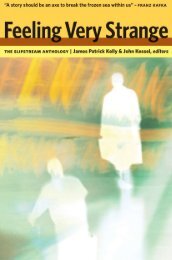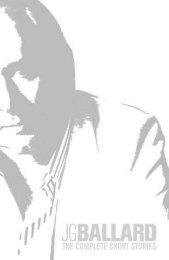The Curse of the Wer.. - Site de Thomas - Free
The Curse of the Wer.. - Site de Thomas - Free
The Curse of the Wer.. - Site de Thomas - Free
Create successful ePaper yourself
Turn your PDF publications into a flip-book with our unique Google optimized e-Paper software.
A MANIFESTO FOR WEREWOLVES<br />
<strong>the</strong>se subsequent narratives, <strong>the</strong> wolf is a sympa<strong>the</strong>tic character whose<br />
dogged <strong>de</strong>votion to her lover in spite <strong>of</strong> her altered form eventually<br />
enables <strong>the</strong>m to be reunited.<br />
Quinn’s stories are notable for <strong>the</strong>ir sympa<strong>the</strong>tic focus on a feminine<br />
experience <strong>of</strong> lycanthropy, and draw on <strong>the</strong> structure and <strong>the</strong>matics <strong>of</strong><br />
<strong>the</strong> fairy tale, a genre that Marina Warner has argued carries ‘a whiff <strong>of</strong><br />
femininity’. 32 This shift towards <strong>the</strong> feminine in <strong>the</strong> generating texts <strong>of</strong><br />
mo<strong>de</strong>rn fantasy lends some support to Charlotte Spivack’s speculation<br />
that fantasy is a ‘feminine’ form. 33 Certainly, while by no means all<br />
explorations <strong>of</strong> <strong>the</strong> werewolf in fantasy are written by women or are<br />
explicitly feminist, a high proportion <strong>of</strong> fantasy narratives focused on<br />
lycanthropy explore <strong>the</strong>mes which have been a consistent feature <strong>of</strong><br />
feminist critical thought, and many trace a specifically female experience<br />
<strong>of</strong> lycanthropy. In<strong>de</strong>ed, <strong>the</strong> <strong>de</strong>velopment <strong>of</strong> <strong>the</strong> female werewolf in<br />
twentieth-century culture has been inseparable from <strong>the</strong> <strong>de</strong>velopment<br />
<strong>of</strong> <strong>the</strong> genre <strong>of</strong> fantasy.<br />
Quinn’s characterizations <strong>of</strong> benevolent, loyal wolves also diverged<br />
from <strong>the</strong> traditions <strong>of</strong> Gothic horror, and presaged <strong>the</strong> rehabilitation<br />
<strong>of</strong> <strong>the</strong> wolf within environmentalism. Don D. Elgin argues that<br />
environmentalist perspectives are central to fantasy when he argues<br />
that fantasy is a form related to comedy (as opposed to tragedy) and<br />
<strong>the</strong>refore exhibits a pr<strong>of</strong>ound appreciation <strong>of</strong> ecology. Using ‘ecology’<br />
to refer to <strong>the</strong> symbiotic relationships between humanity, o<strong>the</strong>r forms<br />
<strong>of</strong> life, and <strong>the</strong> earth, Elgin suggests that our current ecological crisis<br />
is rooted in Western literary and philosophical traditions that have<br />
privileged tragic art. <strong>The</strong> human-centred logic <strong>of</strong> tragedy, argues<br />
Elgin, has assumed ‘that nature is ma<strong>de</strong> for human kind; that human<br />
morality transcends natural limits; and that <strong>the</strong> individual human<br />
personality is supremely important’ — assumptions that have brought<br />
environmental disaster upon us. 34 But if tragedy neglects ecological<br />
concerns, comedy positions humanity ‘as but one part <strong>of</strong> a system to<br />
which it must accommodate itself and whose survival must be a primary<br />
concern if it hopes to continue to exist’. 35 Having established this<br />
framework <strong>of</strong> analysis, Elgin goes on to <strong>de</strong>monstrate that <strong>the</strong> principles<br />
<strong>of</strong> comic philosophy are central to <strong>the</strong> fantasy novel. He argues that<br />
139





